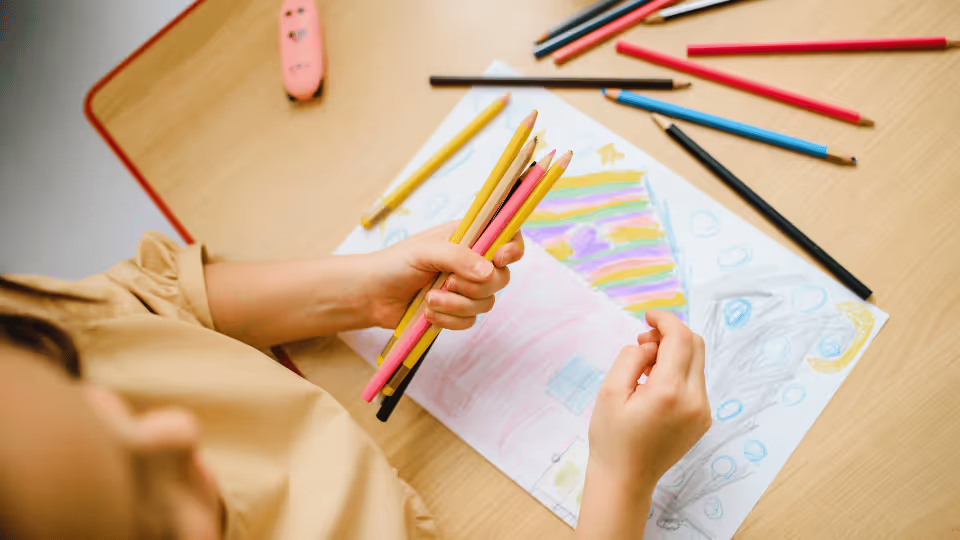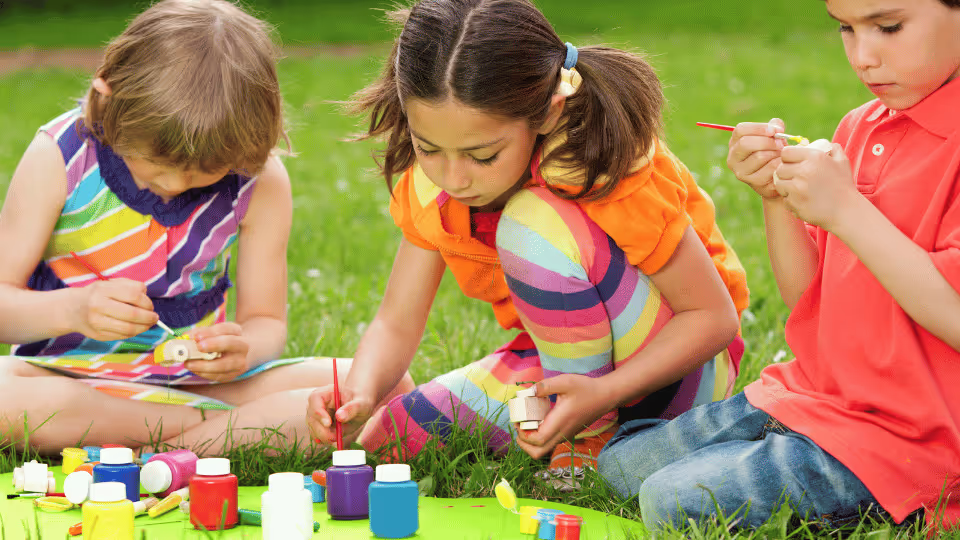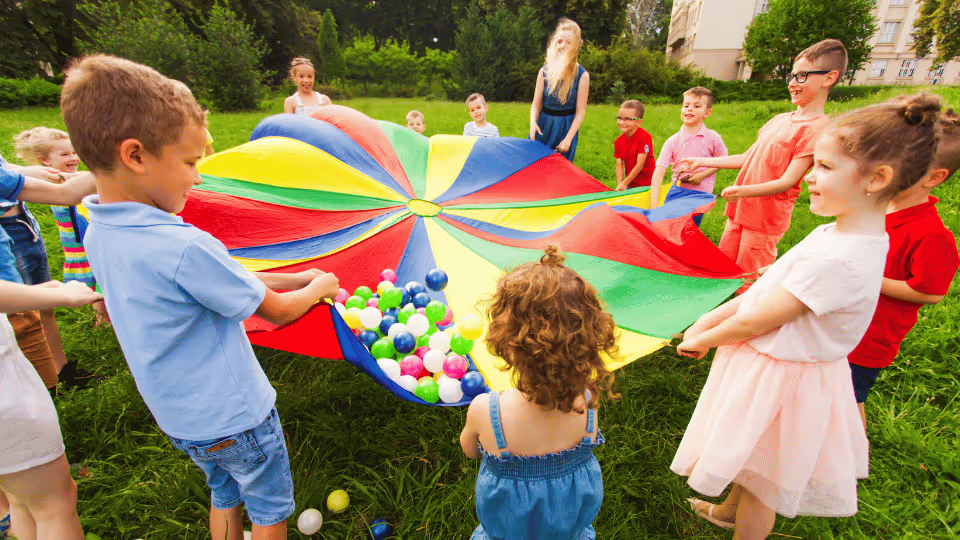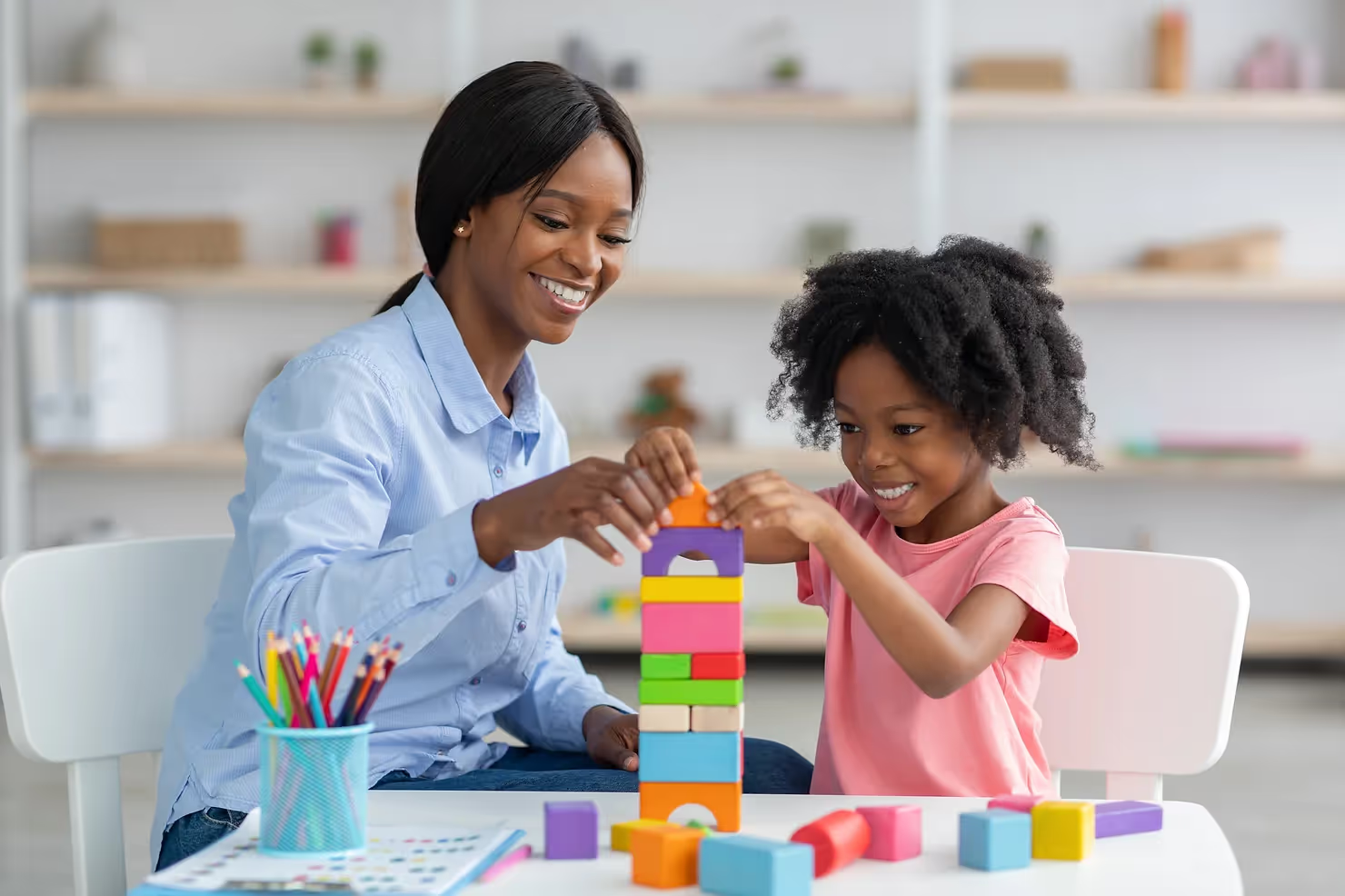
Coral Care content is reviewed and approved by our clinical professionals so you you know you're getting verified advice.
Find effective support for developmental delays, quickly.



Concerned about your child's development?
Our free screener offers guidance and connects you with the right providers to support your child's journey.
Looking for fun and engaging ways to support your child’s development this summer? These DIY projects are perfect for boosting both fine and gross motor skills in kids while keeping them active and entertained! From creative crafts that strengthen hand coordination to outdoor games that build balance and strength, these hands-on activities are easy to set up and packed with developmental benefits. Whether you're at home, in the backyard, or on the go, these summer ideas make learning through play easy and exciting!
Key Takeaways
- Summer is an optimal time for children to develop fine and gross motor skills through various hands-on projects and outdoor activities.
- Fine motor skills involve small muscle coordination, while gross motor skills focus on larger muscle movements; both are essential for children’s growth and independence.
- DIY projects and outdoor games can be adapted for children of different ages and abilities, promoting inclusivity and engagement in motor skill development.
- Support your child’s development this summer (and every season!) with Coral Care’s comprehensive therapy services. Book a consultation today for expert care in pediatric physical, speech, and occupational therapy within two weeks or less.
Why Summer is the Perfect Time for Motor Skill Development

The summer season brims with potential for child development. With kids out of school and longer daylight hours, it provides an ideal backdrop for activities that foster motor skill growth. The flexibility of summer schedules enables families to dedicate ample time to hands-on projects and outdoor play, important for developing both fine and gross motor skills.
Extended daylight hours offer more opportunities for children to play outside during the day. Outdoor activities not only promote physical fitness, but also naturally enhance motor skills and have positive effects on mood. Running, jumping, and games in open spaces combined with fresh air provide an ideal environment for children to develop their skills. Summer activities can help encourage children to keep working towards their therapy goals.
Understanding Fine vs. Gross Motor Skills
Fine motor skills involve small muscles, particularly in the hands and fingers. These are necessary for tasks like writing, buttoning clothes, and picking up small objects. Activities enhancing these skills often require hand-eye coordination and dexterity.
In contrast, gross motor skills involve larger muscle groups for major movements like walking, jumping, and running. These skills are essential for overall physical activity and coordination. Activities like climbing, dancing, and sports promote gross motor skills, building strength and endurance.
Both types of motor skills are crucial for a child’s growth and independence. Fine motor skills enable precise everyday tasks, while gross motor skills allow confident and safe navigation of their environment. Engaging in activities targeting both skill types helps children develop a well-rounded set of abilities for life.
DIY Summer Projects to Strengthen Fine Motor Skills

Summer crafts enhance fine motor skills and allow children to explore creativity. These activities are therapeutic, keeping children engaged and improving dexterity. Utensil painting, where children use forks and spoons to create textured patterns on paper, promotes bilateral coordination and motor planning by manipulating utensils with both hands.
Ice cream cone crafts, where children cut and assemble paper parts to create colorful ice cream cones, enhance scissor skills and encourage precise hand movements. Potato printing, which involves carving shapes or simple designs into halved potatoes, dipping them in paint, and stamping them onto paper, builds sensory tolerance and improves eye-hand coordination.
Firework finger painting, where children use their own fingers to create vibrant designs on paper, adds sensory input and helps develop coordination and motor control. Crafts like fairy wands and summer Olympic rings involve precision tasks enhancing dexterity and strength. Decorating fairy wands with beads and ribbons requires careful threading and tying, while summer Olympic rings involve cutting and assembling paper rings.
Making sun catchers and using baking soda paints also refine scissor skills and hand movements. Sun catchers involve cutting shapes from translucent blue paper and decorating them with colorful designs. Baking soda paints, made by mixing baking soda with paint, offer a unique texture for children to explore while painting, enhancing sensory experiences and fine motor skills.
Outdoor Games and Activities for Gross Motor Development

Outdoor games and activities are a fun and effective way to support the development of gross motor skills; they offer children valuable opportunities for physical movement, helping to build strength, coordination, balance, and body awareness.
Start with a simple game of Simon Says, which encourages kids to follow movement-based instructions. This playful activity promotes body awareness, motor planning, and listening skills. Similarly, dancing to favorite songs supports balance, coordination, and sensory processing, all while engaging kids through rhythm and fun movement. These physical activities can be done in your own yard or patio.
Public parks and playgrounds can offer a variety of activities as well; exploring uneven outdoor surfaces like grass, sand, or gravel helps children develop strength, endurance, and sensory integration. Climbing and swinging on monkey bars builds arm and core strength, improves coordination, and encourages motor planning.
Add some playful challenges with animal walks—like bear crawls or crab walks—which boost upper body strength and coordination in a silly, engaging way. These are great for both group games and solo movement breaks.
Creating a DIY obstacle course in the backyard is a fantastic way to combine multiple gross motor skills. Kids can practice climbing over, crawling under, and jumping through obstacles, which promotes agility, strength, and sequencing.
Incorporating sidewalk chalk adds a creative twist! Drawing encourages full-arm movement and strengthens the non-dominant hand. Create a chalk balance beam to challenge coordination and stability, or set up a classic hopscotch game to improve jumping skills, timing, and spatial awareness.
For a more imaginative play session, use chalk to draw a racetrack and let kids ride scooters or push toys along the path—this promotes motor planning and bilateral coordination. A game of chalk Twister adds color recognition to the mix while enhancing balance and movement planning.
Lastly, don’t overlook gardening activities. Digging, watering, and carrying tools or soil engage arm and core muscles while encouraging balance and postural control. Gardening offers a calm, purposeful way to support gross motor development with real-world tasks.
Creative Sensory-Friendly Summer Fun

For children with sensory sensitivities, a structured and predictable schedule during summer activities can ease anxiety and enhance their experience. Plan sensory-friendly outings in quiet, low-crowd environments. Engaging in water play, like gentle splashing in a quiet pool or playing with a variety of water toys, enhances relaxation and coordination while providing rich sensory experiences.
Arts and crafts activities promote creativity and fine motor skills, offering a sensory-rich environment where children can explore different textures, scents, and colors. Cooking and baking allow children to explore textures and smells, integrating sensory-rich experiences with skill learning.
Music and movement activities like dancing enhance communication and socialization skills, especially for children with autism. These activities encourage self-expression through movement and rhythm, fostering joy and creativity. Gardening activities teach responsibility and patience while providing tactile sensory input, making them a valuable addition to any summer schedule.
Kid-Friendly DIY Activities
Engaging kids in DIY activities fosters creativity, problem-solving skills, and quality family time. Making sidewalk chalk at home allows children to mix colors and create fun shapes. Crafting DIY paper from old worksheets encourages recycling and creativity, showing kids the value in repurposing materials.
Building a fire-breathing dragon from cardboard tubes inspires imaginative play and helps develop fine motor skills. Creating worry monsters from painted stones allows kids to express feelings and anxieties in a fun and artistic way. Designing and creating magnetic race tracks teaches kids about magnetism while providing engaging activities.
Building a vegetable garden is an engaging way for families to learn about sustainability while enjoying fresh produce. These activities entertain kids and provide educational opportunities and life skills for people. A parent should supervise to ensure safety and engage in the fun alongside their kids.
Adapting Projects for Different Ages and Abilities
Customizing DIY projects to suit different ages and abilities ensures that every child can participate meaningfully and enjoy the creative experience. By adjusting the complexity of each activity, younger children can explore simpler versions, while older kids can take on more detailed, challenging tasks.
To make crafts more inclusive and engaging, incorporate sensory elements such as texture, color, and sound. These features can enhance accessibility for children with diverse sensory needs and learning styles.
Using everyday household items keeps projects affordable and accessible, making it easier for families from all backgrounds to participate. For children with physical or developmental differences, adaptive tools—like easy-grip scissors or larger craft materials—can help them engage more confidently and independently.
Breaking tasks into smaller, manageable steps is especially helpful for younger children or those with learning difficulties, making the process easier to follow and less overwhelming. Visual aids, such as step-by-step picture guides or example projects, can further support understanding and boost engagement.
Encouraging peer collaboration fosters teamwork and shared learning. When kids help one another and adapt activities together, it creates a supportive environment where everyone feels included. Additionally, offering choices within each project allows children to express their individuality, focus on their strengths, and take ownership of their creations.
With thoughtful adaptations and a flexible approach, DIY activities can become a joyful, empowering experience for every child—no matter their age, ability, or background. Discover project ideas, parenting tips, and more through Coral Care’s family blog.
Summary
Summer is the perfect time to engage children in a wide range of DIY projects and hands-on activities that support the development of both fine and gross motor skills. From calming, therapeutic crafts to active outdoor games and sensory-rich experiences, there are endless opportunities to keep kids learning, moving, and having fun. By adapting these activities to suit different ages and abilities, every child can participate fully and benefit from the experience.
So gather your supplies, head outdoors, and dive into a summer filled with creativity, connection, and growth. These simple yet meaningful activities not only promote motor development but also strengthen family bonds and create lasting memories. Let’s make this summer a joyful season of learning and play for every child.
Frequently Asked Questions
If you notice your child struggling with motor skills, communication, focus, or social interaction compared to peers—or if your gut tells you something feels off—it may be time to explore a developmental evaluation. Coral Care offers consultations to help you understand your child’s needs and whether therapy could be beneficial. Visit joincoralcare.com to get started.
To effectively adapt summer activities for various ages and abilities, tailor the complexity to suit each child's developmental level. You can incorporate sensory elements and adaptive tools, and break tasks into smaller, manageable steps. This approach enables meaningful participation and enjoyment for every child.
Summer activities effectively enhance motor skill development by providing ample opportunities for outdoor and hands-on engagement in a generally mild weather environment, allowing for consistent practice and achievement of developmental goals. Such activities foster both gross and fine motor skills through enjoyable experiences.
Walking, jumping, and climbing are prime examples of gross motor skill activities that enhance strength, coordination, and overall physical fitness. Learning to engage in these activities is essential for children developing larger muscle groups.
Fine motor skills are essential for the coordination of small muscles, particularly in the hands and fingers, enabling precise tasks such as writing and buttoning clothes. Mastery of these skills is vital for performing everyday activities effectively and fostering independence.
Coral Care connects families with licensed pediatric therapists who specialize in supporting developmental milestones—from fine and gross motor skills to sensory processing, speech, and social-emotional growth. Whether your child needs targeted therapy or just a little extra support, our experts provide personalized, play-based sessions that help kids thrive at their own pace.




.png)
